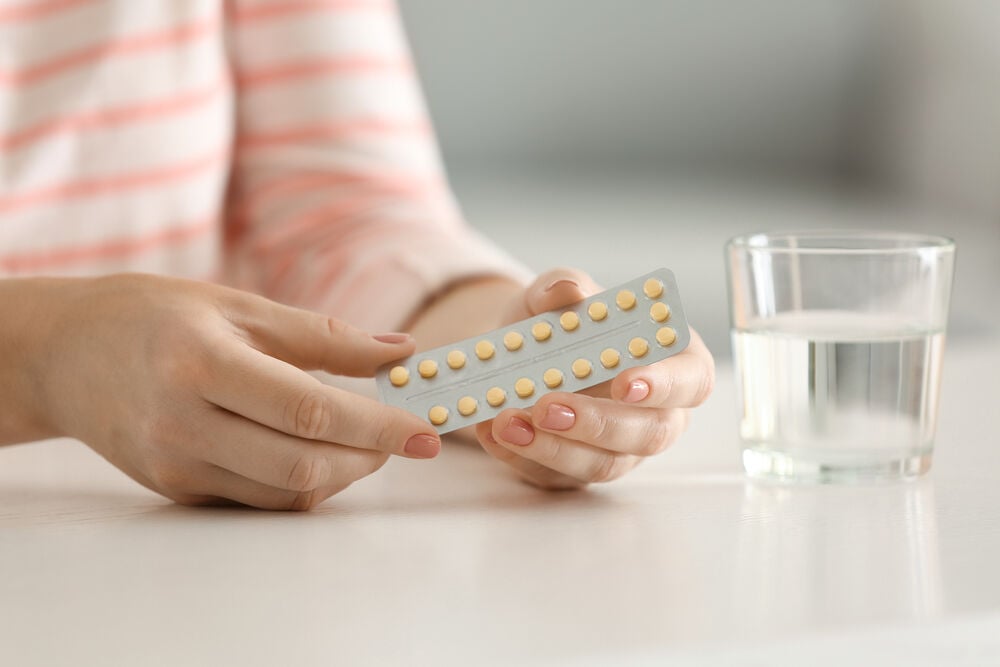Let’s take a more detailed look at how birth control pills work, the different types of pills, and their effectiveness.
-
Tracking cycle
-
Getting pregnant
-
Pregnancy
-
Help Center
-
Flo for Partners
-
Anonymous Mode
-
Flo app reviews
-
Flo Premium New
-
Secret Chats New
-
Symptom Checker New
-
Your cycle
-
Health 360°
-
Getting pregnant
-
Pregnancy
-
Being a mom
-
LGBTQ+
-
Quizzes
-
Ovulation calculator
-
hCG calculator
-
Pregnancy test calculator
-
Menstrual cycle calculator
-
Period calculator
-
Implantation calculator
-
Pregnancy weeks to months calculator
-
Pregnancy due date calculator
-
IVF and FET due date calculator
-
Due date calculator by ultrasound
-
Medical Affairs
-
Science & Research
-
Pass It On Project New
-
Privacy Portal
-
Press Center
-
Flo Accuracy
-
Careers
-
Contact Us
How to Take Birth Control Pills: A Step-by-Step Guide


Every piece of content at Flo Health adheres to the highest editorial standards for language, style, and medical accuracy. To learn what we do to deliver the best health and lifestyle insights to you, check out our content review principles.
Oral contraceptives — commonly known as birth control pills or just "the pill" — began to be produced in the mid-1900s. Over the last decades, they have revolutionized our sexual health.
Today, people around the world take different birth control pills to prevent pregnancy. These pills can be up to 99.7 percent effective when taken correctly. Thanks to the wide range of contraceptives available today, everyone can choose the type that best fits their lifestyle and budget.
If you're new to the pill, here’s a quick overview of what the hormonal contraceptives can do, including how birth control affects ovulation. (FYI, this article doesn't extend to emergency contraception, also known as the morning after pill.)
How birth control pills work
Birth control pills contain varying amounts of human-made estrogen and progestin or just progestin. These hormones inhibit certain aspects of the menstrual cycle to prevent pregnancy.
The pill has several factors at play that prevent pregnancy. The combination of hormones stops ovulation. What’s more, the pill also thickens the mucus around the cervix, making it difficult for the sperm to enter the uterus and reach any eggs.
When to use the pill as your primary birth control method
Use the pill as your primary birth control method if you want to:
- Have sex without getting pregnant
- Manage your reproductive health
- Avoid a high-risk pregnancy
- Treat debilitating symptoms connected to PMS
- Improve your quality of life
- Make your periods come at regular times
Birth control pills can also:
Take a quiz
Find out what you can do with our Health Assistant

When can you start using birth control pills?
You can begin taking birth control pills in three different ways:
- On the first day of your period: You can start your pills on the first day of your period and take one every day, at the same time. With this method, you don’t need to use any backup pregnancy protection.
- On a day that best works for you: You can start taking your pills on any day that’s good for you. Then, continue to take one every day, at the same time. If pills are taken within five days of your period starting, you don’t need additional contraceptive protection. If you start the pill more than five days after the beginning of menstruation, you’ll need to abstain from sex or use additional contraceptive protection for the next seven days.
- On a Sunday: Beginning on the first Sunday after the start of your period, take one pill every day, at the same time, continuously.
If you begin the pills within five days of starting menstruation, you won’t need additional contraceptive protection.
If you start the pills more than five days after the beginning of menstruation, you’ll need to abstain from sex or use additional contraceptive protection for the next seven days.
Although you can take the pill at any time during the day, many people pair this step with a consistent part of their routine like breakfast, brushing teeth, or bedtime.
Types of birth control pills
The most common birth control pills are combination pills, which have a mix of estrogen and progestin hormones. Generally, combination pills come in 28-day, 21-day, 90-day, or 365-day packs.
Most pills in a pack are active, which means they contain hormones. Some packs also have inactive pills, which don’t contain hormones. These non-hormonal birth control pills are also called placebo pills. Taking the placebo pills will result in withdrawal bleeding (similar to a period).
Today, we can choose between different options, including regimens that are all active pills or a mix of active pills and placebo or non-hormonal birth control pills.
Combination Pills (COCs)
- 28-day packs
These are the most common birth control pills, and they come packaged in a thin case. Depending on the brand, the first 21-26 pills in a pack have the hormones estrogen and progestin. The rest are usually inactive, or dummy pills (placebo). To remind you to take your pill every day, the pill packs are marked with the days of the week.
- 21-day packs
These packs contain 21 active pills. When using these pills, you’ll take one pill every day for 21 days. Then, for seven days, don’t take any. This will prompt your period.
- 91-day packs
In this case, you’ll take one pill at the same time each day for 84 days. Depending on the brand, the last seven pills will contain either no hormones or estrogen only. In both cases, you will have your period on the last seven days every three months.
- 365-day packs
With these packs, you’ll take one pill at the same time each day for a year. Over time, your menstrual bleeding may become lighter and even stop.
Progestin-Only Pills (Minipills)
These common birth control pills contain only one hormone (progestin). They don’t contain estrogen and are often prescribed if a person:
- Experiences side effects from estrogen
- Is a smoker and over 35 years old
- Is breastfeeding
- Has high blood pressure
- Has dermatitis
Just like combination pills, you’ll need to take a pill once a day, every day. The minipills come in a pack of 28, without a row of inactive or non-hormonal birth control pills. With minipills, unpredictable bleeding can often occur as a side effect, as well as short cycles of bleeding or spotting. However, some people experience no bleeding at all.
If you happen to take the minipill more than three hours outside of your usual time, it may not prevent pregnancy as effectively. If this happens, use a condom or avoid sex for two days.
How effective is the pill?
According to the Centers for Disease Control and Prevention (CDC), minipills and combination pills have eight percent failure rates with typical use. This means that eight out of 100 women will get pregnant while using the pill. This mostly happens if someone forgets to take the pill regularly. When used as directed, the pill has a failure rate of less than one percent.
The minipills must be taken within the same three-hour window every day to avoid getting pregnant.
The combination pills offer slightly more flexibility. Try to take them at the same hour every day. If you miss an active pill, take it as soon as you remember — even if it means taking two active pills in the same day.
If you’ve missed two or more consecutive hormonal pills (i.e., if there’s a delay of 48 hours or more), use backup contraception such as condoms or avoid sex until you’ve taken the pills for seven consecutive days.

How to take birth control pills
If you’re wondering how to use birth control pills properly, there are several simple steps to follow:
- Take one pill daily, at the same hour.
- Follow the instructions on your pack.
- If you’re taking 21-day pills, don’t take any pills during the fourth week.
- If you’re using 28-day pills, once you get to the placebo pills at the end of the pack, start taking them the same way.
- For 91-day combination pills, take one pill at the same time every day for 84 days. During the last week, take one non-hormonal birth control pill or one that only contains estrogen at the same time every day for seven days.
- For 365-day pills, take one pill at the same time each day for a year.
- If you’re taking minipills, take one pill each day at the same hour. When you finish your pack of pills, start a new pack the next day.
As long as you take the pills as directed, you are protected from getting pregnant.
Stopping birth control pills
When you decide to stop taking birth control pills, your body will need time to return to normal.
Most people report ovulating a few weeks after stopping birth control pills. For others, regular ovulation cycles may return after a few months.
If you stop taking the pill but still don’t feel ready to get pregnant, you might want to consider other birth control methods.
Today, there’s a wide range of different birth control pills. Your health care provider can help you select the most appropriate option and answer any questions you may have, including:
- What type of birth control pills would be best for me?
- I am taking certain medications. Can they cause problems with birth control pills?
- What are the side effects of birth control pills?
- Is there anything I should know about stopping birth control pills?
- Should I use other contraceptive methods along with birth control pills?


Hey, I'm Anique
I started using Flo app to track my period and ovulation because we wanted to have a baby.


The Flo app helped me learn about my body and spot ovulation signs during our conception journey.


I vividly
remember the day
that we switched
Flo into
Pregnancy Mode — it was
such a special
moment.
Real stories, real results
Learn how the Flo app became an amazing cheerleader for us on our conception journey.




